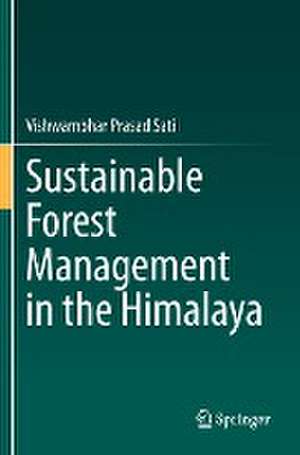Sustainable Forest Management in the Himalaya
Autor Vishwambhar Prasad Satien Limba Engleză Paperback – 3 ian 2024
| Toate formatele și edițiile | Preț | Express |
|---|---|---|
| Paperback (1) | 777.77 lei 6-8 săpt. | |
| Springer International Publishing – 3 ian 2024 | 777.77 lei 6-8 săpt. | |
| Hardback (1) | 784.52 lei 3-5 săpt. | |
| Springer International Publishing – 2 ian 2023 | 784.52 lei 3-5 săpt. |
Preț: 777.77 lei
Preț vechi: 948.50 lei
-18% Nou
Puncte Express: 1167
Preț estimativ în valută:
148.85€ • 154.82$ • 122.88£
148.85€ • 154.82$ • 122.88£
Carte tipărită la comandă
Livrare economică 12-26 aprilie
Preluare comenzi: 021 569.72.76
Specificații
ISBN-13: 9783031219382
ISBN-10: 3031219384
Pagini: 172
Ilustrații: XXX, 172 p. 71 illus., 69 illus. in color.
Dimensiuni: 155 x 235 mm
Greutate: 0.32 kg
Ediția:1st ed. 2023
Editura: Springer International Publishing
Colecția Springer
Locul publicării:Cham, Switzerland
ISBN-10: 3031219384
Pagini: 172
Ilustrații: XXX, 172 p. 71 illus., 69 illus. in color.
Dimensiuni: 155 x 235 mm
Greutate: 0.32 kg
Ediția:1st ed. 2023
Editura: Springer International Publishing
Colecția Springer
Locul publicării:Cham, Switzerland
Cuprins
Chapter 1. Introduction.- Chapter 2. Forest Land Use/Cover Change.- Chapter 3. Forest Classifications and Working Circles.- Chapter 4. National Parks, Wildlife Sanctuaries, and Conservation Reserves.- Chapter 5. Forest Diversity and Distribution.- Chapter 6. Forest Stocks and Products.- Chapter 7. Environmental Index.- Chapter 8. Ecosystem Goods and Services.- Chapter 9. Drivers of Forest Degradation and Conservation Measures.- Chapter 10. Climate Change and Forests.- Chapter 11. Cultural and Socio-Economic Significance of Forests.- Chapter 12. Sustainable Forest Management.- Chapter 13. Conclusions.
Notă biografică
Vishwambhar Prasad Sati (b. 1966), D.Litt. and Ph.D., a Senior Professor of Geography and Resource Management, is currently working at the Mizoram University (A Central University), Aizawl, India. With a teaching career of about three decades, he has served in several higher education institutions within and outside India, some of them being ‘Eritrea Institute of Technology’, Asmara, Eritrea (NE Africa), ‘Institute of Mountain Hazards and Environment’, Chengdu, China, ‘Madhya Pradesh Higher Education’, and ‘HNB Garhwal University’, Srinagar Garhwal. In the same field, he has deeply been involved in research, and has worked as a Visiting Professor and Visiting Scholar in the world’s various renowned research and academic institutions, including ‘The World Academy of Sciences’, ‘Chinese Academy of Sciences’, ‘Indian National Science Academy’, ‘Indian Council of Social Science Research’, and ‘Indian Institute of Advanced Studies’. Besides, he has travelled widely – 36 countries andall over India. He has an impactful expertise in the fields of Natural Resource Management, Environment-Development Interface, Climate Change, Rural Livelihoods, Disaster-Related issues, and Culture of the Himalayan region. He has developed several models and action plans for environmental conservation and economic development of the fragile Himalayan ecosystems/landscapes. More than a dozen of national individual projects and projects with international collaboration have been conducted by him. With more than 160 research papers and articles, and about three dozen books published, his academic contribution is well-documented at national and international levels.
Textul de pe ultima copertă
This volume presents a comprehensive description of forests of the Uttarakhand Himalaya. It looks into the major drivers of forest depletion and suggests paths toward sustainable forest management. The book comprises thirteen chapters, which together describe forest land use/cover change; forest classification and working circles; national parks, wildlife sanctuaries, and conservation reserves; forest diversity and distribution; forest stocks and products; ecosystem goods and services; environmental index; drivers of forest degradation and conservation; climate change and forests; cultural and economic significance of forests, and sustainable forest management. The text is richly complemented by nearly seventy photographs and figures.
Caracteristici
Addresses ways to mitigate forest depletion in the face of a changing climate Discusses products and services derived from the forests of the Uttarakhand Himalaya Lessons learned here are applicable to other mountain forestscapes
